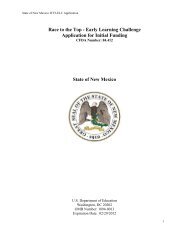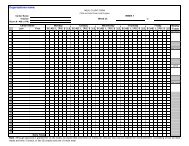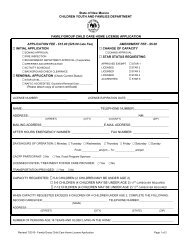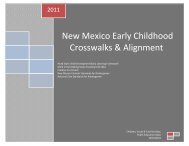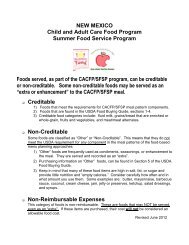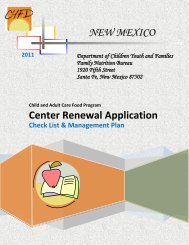Child Care and Development Fund (CCDF) Plan ... - New Mexico Kids
Child Care and Development Fund (CCDF) Plan ... - New Mexico Kids
Child Care and Development Fund (CCDF) Plan ... - New Mexico Kids
You also want an ePaper? Increase the reach of your titles
YUMPU automatically turns print PDFs into web optimized ePapers that Google loves.
1.3.5. What type of sanction, if any, will the Lead Agency place on clients<br />
<strong>and</strong> providers to help reduce improper payments due to program<br />
violations?<br />
None<br />
Disqualify client. If checked, please describe, including a description of the appeal<br />
process for clients who are disqualified <strong>Child</strong> <strong>Care</strong> Assistance Regulations (8.15.2.21 NMAC)<br />
state: If a client or provider fails to meet programmatic requirements that affect benefits <strong>and</strong> result in<br />
an overpayment, sanctions may be imposed according to the severity of the infraction as determined<br />
by the department <strong>and</strong> detailed below.<br />
A. Providers or clients who fail to make timely payments in the case of recoupment of<br />
overpayments may be disqualified from the program until payment is brought current.<br />
B. Providers or clients who fail to report in a timely manner that a child is not in attendance for<br />
five consecutive, scheduled days will have the payment recoupment process initiated.<br />
C. Clients who fail to pay co-payments may be disqualified until the co-payment is paid or<br />
until an agreement is made between the client <strong>and</strong> the provider to bring the co-payment current. The<br />
department assists the provider in collecting the co-payment only if the co-payment has been in<br />
arrears 30 calendar days or less. Clients who fail to timely report changes that affect their eligibility<br />
resulting in an overpayment may be sanctioned <strong>and</strong> payment recoupment may be sought for the<br />
entire amount accruing from the end of the five business days allowed for notification through the<br />
date the client provides notice of the change to the department. A first offense may result in a written<br />
warning <strong>and</strong> recoupment; a second offense may result in a three-month suspension <strong>and</strong> recoupment;<br />
<strong>and</strong> a subsequent offense may result in permanent disqualification.<br />
The appeal process, outlined in section (8.15.2.22 NMAC) state: Clients who have been denied<br />
benefits, whose benefits have been reduced, suspended, or terminated, or who have been<br />
sanctioned or disqualified from the program, or providers who have been sanctioned, disqualified<br />
from the program, had assistance payments suspended or terminated, or from whom a payment<br />
recoupment is being sought may request a fair hearing. The request for a fair hearing must be made<br />
in writing within 30 calendar days from the date the department took the adverse action affecting the<br />
claimant’s benefits.<br />
A. The department reviews the request for hearing <strong>and</strong> determines if the matter can be<br />
resolved without proceeding to a fair hearing. If the matter cannot be resolved without a fair hearing,<br />
the department conducts the fair hearing within 60 calendar days of receipt of the letter requesting the<br />
hearing <strong>and</strong> notifies the claimant of the date of the hearing no less than 14 calendar days prior to the<br />
hearing. The location of the hearing must be easily accessible to the claimant. Conducting the fair<br />
hearing by telephone is permitted. The claimant may request a change of date, provided that the 60<br />
calendar day time limit is not exceeded.<br />
B. The department appoints a hearing officer. The department is not responsible or liable for<br />
a claimant’s travel costs, legal costs, or any other costs associated with the claimant’s request for a<br />
fair hearing.<br />
C. The hearing officer reviews all of the relevant information <strong>and</strong> makes a final decision within<br />
30 calendar days of the hearing. The final decision is binding upon the department <strong>and</strong> claimant <strong>and</strong><br />
implemented within 14 calendar days of the hearing decision. The claimant is notified in writing of the<br />
hearing officer’s decision within 14 calendar days of the hearing decision.<br />
D. At the claimant’s option the case may remain open at the same benefit level until<br />
disposition. If the decision is in favor of the department, the claimant is responsible for repayment of<br />
all monies received to which the claimant was not entitled, unless the hearing decision provides<br />
otherwise or the early childhood services director authorizes otherwise in exceptional circumstances.<br />
The fair hearing process is not intended as a means to extend the time for receipt of child care<br />
assistance payments to which the recipient is not otherwise entitled, <strong>and</strong> therefore exceptional<br />
circumstances must be explicitly stated.<br />
<strong>CCDF</strong> <strong>Plan</strong> Effective Date: October 1, 2013<br />
Amended Effective: _____<br />
Page 14



